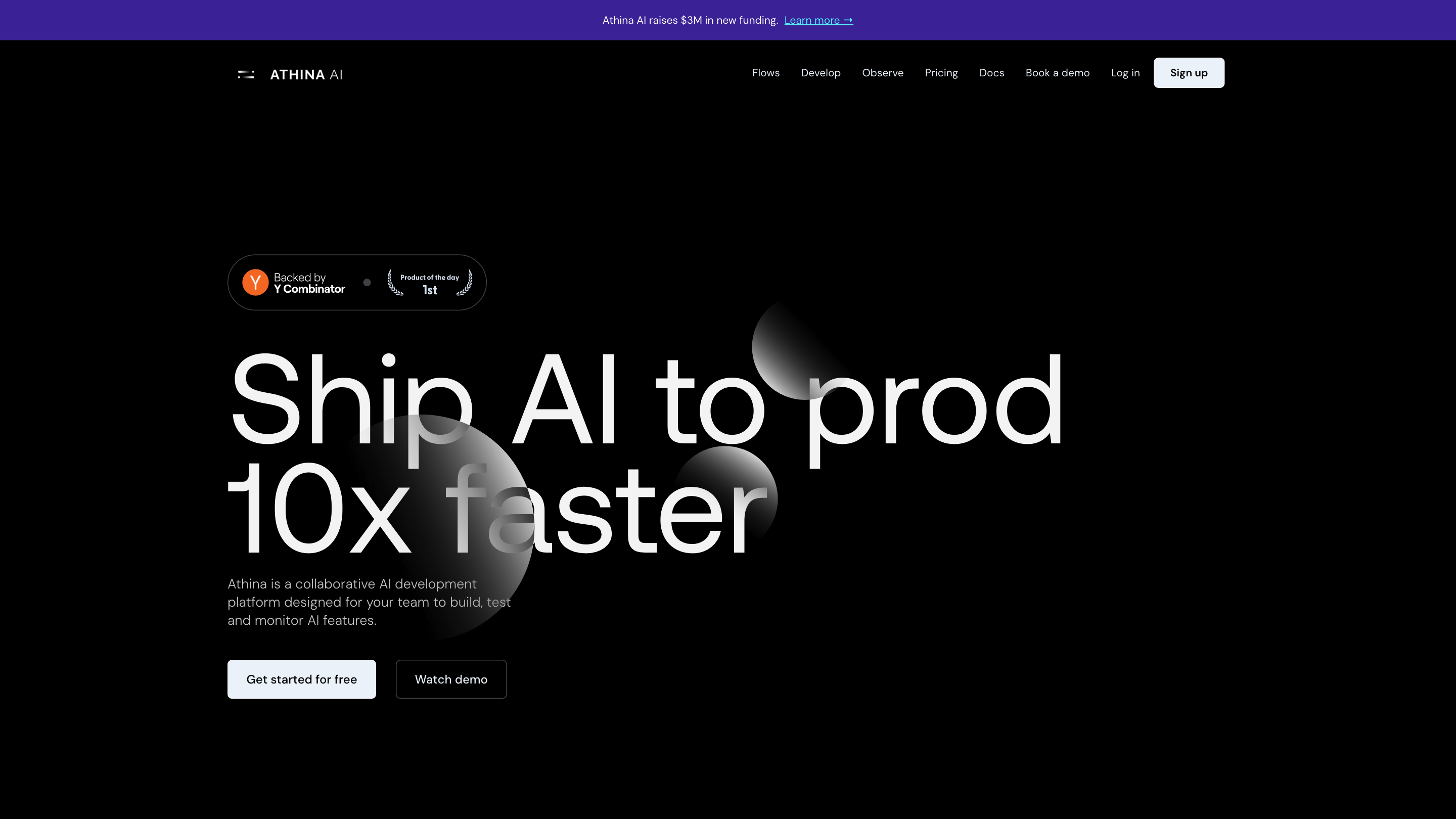Athina AI
Open siteResearch & Data Analysis
Introduction
Monitor LLMs and detect hallucinations in prod
Athina AI Product Information
Athina AI
Athina AI is a collaborative AI development platform designed for teams to build, test, evaluate, and monitor AI features at scale. It enables non-technical and technical users to collaborate on experiments, manage prompts and evaluation flows, and monitor production AI with rich observability. The platform emphasizes flexible collaboration, dataset evaluation, and end-to-end prompt/flow management, with options for both cloud and self-hosted deployments.
Overview
- Supports building, testing, evaluating, and monitoring AI prompts, flows, and datasets across models (including custom models).
- Combines code-optional UI workflows with programmatic access for engineers, enabling rapid iteration and deployment.
- Provides cross-role collaboration among Data Scientists, Product Managers, QA teams, and Engineers.
- Offers evaluation suites, dataset management, prompt versioning, and end-to-end monitoring and tracing for AI systems.
Key Capabilities
- Evaluate datasets using 50+ preset evaluations or configure custom evaluations
- Re-generate datasets by tweaking model, prompt, or retriever with a few clicks
- Prototype powerful prompt and flow chains and run them programmatically
- End-to-end collaboration across your team with role-based access and governance
- GraphQL API and SDKs for programmatic control
- Observability for AI: online evaluations, tracing, and analytics tailored for LLM workflows
- Self-hosted deployments available with SOC-2 Type 2 compliance
How It Works
- Create and manage prompts, prompts variants, and prompt runs
- Build evaluation pipelines (eval suites) that test model outputs against criteria such as correctness, faithfulness, context sufficiency, and more
- Manage datasets (queries and expected responses), compare datasets side-by-side, and annotate results with human QA inputs
- Run prompts, flows, and evaluations via UI or programmatically through code
- Monitor production AI with tracing, analytics, and cost/latency metrics, while maintaining data privacy and access controls
Target Users
- Data Scientists: Compare datasets, run evaluations, and iterate model/prompts with SQL-powered dataset interactions
- Product Managers: No-code AI engineering to build complex AI flows and monitor performance
- QA Teams: Leverage human QA to validate nuanced results alongside automated evals
- Engineers: Access everything via code, run prompts/flows/evaluations programmatically, and integrate into CI/CD
Pricing & Deployment
- Flexible pricing for teams of all sizes; options include Starter (free tier), Pro, and Enterprise
- Self-hosted deployment available with SOC-2 Type 2 compliance for data privacy and control
Core Features
- Collaborative AI development platform for teams
- No-code UI for building and evaluating AI prompts, flows, and datasets
- Programmatic access via API/SDKs and GraphQL API
- 50+ preset evaluations and support for custom evaluations
- Dataset generation and variant prompting with quick re-generation
- Prompt, flow, and evaluation orchestration with versioning
- End-to-end observability: AI traces, online evals, and analytics tailored for LLMs
- Role-based access control and governance for multi-team environments
- Self-hosted deployment option with SOC-2 Type 2 compliance
- Integrated sample deployments and real-world success stories from leading teams
Quick Start (High-Level)
- Set up your Athina API key and connect your data/models.
- Create prompts and prompt variants for your use case.
- Build evaluation suites using preset evaluators or custom rules.
- Upload or connect datasets; run evaluations and review results.
- Iterate on prompts/flows and monitor performance in production with traces and analytics.
Safety & Compliance (General)
- Data privacy controls and self-hosted options help meet organizational security requirements.
- Supports governance and access controls to manage who can view/edit prompts, evaluations, and datasets.
What reviewers say
- Real-world teams highlight Athina as a flexible, fast path to prototyping and monitoring AI workflows, with strong observability and easy collaboration across roles.
